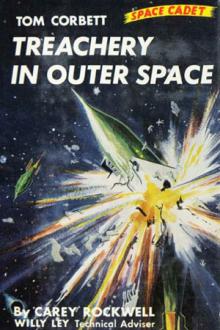Mr. Monk in Outer Space by Goldberg, Lee (best books to read for self development TXT) 📗

Book online «Mr. Monk in Outer Space by Goldberg, Lee (best books to read for self development TXT) 📗». Author Goldberg, Lee
“Could I just hang out here?” Monk said. “My apartment is being recarpeted.”
“There was a coffee stain,” I said.
Monk nudged me hard. Apparently I’d revealed too much.
“Don’t worry, Lieutenant Chase. I wouldn’t bring coffee in here,” Monk said. “I’m not drinking it ever again. I’m not even thinking of coffee. Coffee is banned from my existence.”
“I appreciate that,” she said. “But I’m afraid this is a restricted area. You probably shouldn’t even be here now.”
“My wristwatch has more RAM than the computers that the detectives are using upstairs,” I said. “How come you get all the cool stuff down here?”
“Combating financial crime takes a different breed of cop, entirely new methods of investigation, and the latest technology,” she said. “The resources we receive are in direct proportion to the amount of revenue we’ve brought in.”
“I thought you were supposed to enforce the law,” I said. “I didn’t realize you were supposed to turn a profit, too.”
“Last year we recovered nearly twenty-two million dollars in cash, stocks, and other assets earned by various criminal enterprises,” Chase said. “After the cases we investigate are adjudicated and any victims are reimbursed for their losses, a significant percentage of what remains of those ill-gotten gains is apportioned to the police department to fund our continuing law enforcement efforts.”
“Why can’t some of that money make its way upstairs to Homicide?” Monk said. “Particularly for the housekeeping budget.”
“I’m sure some of it does,” she said. “But we need these tools to do our job effectively and keep up with the technological strides made by the criminals we pursue,” she said. “That costs a lot of money.”
“It takes money to make money,” I said.
“Or to follow money,” Chase added.
“It doesn’t seem fair,” Monk said. “Everybody in the building should be able to enjoy this blissful environment. Especially me.”
“I’m assuming you two didn’t come down here to debate how the police department allocates its resources, ” Chase said.
“We’d like to know what you’ve learned from the document that was found on Brandon Lorber’s desk,” Monk said. “It’s just numbers to us.”
Chase smiled at Monk. “It is far more than mere numerals on a page. Numbers are a lot like people. They each have a story. They interact with one another. They entertain. They inform. They deceive. They can create happiness or inflict enormous pain. You have to know how to get them to talk.”
I could have cheered. She was helping me reinforce the argument I tried to make to Monk at Ambrose’s house and in the interrogation room. Maybe hearing it from her, someone he obviously admired, would have some impact on him. But I wanted to make sure he didn’t miss the point.
“In other words, Mr. Monk,” I said, “she’s saying that what’s insignificant or meaningless to you can have great importance to someone else. Numbers are her second-season ears.”
Chase and Monk both looked at me quizzically. Or gave me withering stares. I don’t know for sure. It was hard to tell in that light, but even in the nearly pitch-dark room it was obvious to me that neither one of them saw my point with the same startling clarity as I did.
“Never mind,” I said. “Lieutenant Chase, what did those numbers have to say to you once you got them into the interrogation room and beat them with a phone book?”
Chase shook her head and turned to Monk.
“Ears and a phone book?” she said. “What do they have to do with anything?”
Monk shrugged. “She’s been babbling nonsense like that all day. Please go on, Lieutenant Chase.”
“To put it simply, that document is a secret internal financial report that reveals that years of financial irregularities,mismanagement, and impropriety are about to catch up to Burgerville. The company is on the verge of total collapse.”
“But it’s one of the biggest fast-food chains in the country, ” I said. “They’ve got restaurants everywhere.”
“That aggressive expansion has cost a lot of money in the midst of a downturn in popularity of their product. The company has been trumpeting its success but the truth is that average store sales have been plummeting for years. They fell twenty-one percent in the last fiscal quarter alone. The company is generating a pitiful cash flow and will take a net loss of more than a hundred million dollars this year.”
“They hid all of that from the public?” Monk asked.
“And from their investors and the government,” Chase said. “But the real crime is what will happen to the employee pension plan, which was sponsored by Burgerville and was made up almost entirely of company stock.”
“When word gets out about their financial problems, the value of the stock will nose-dive,” I said. “Thousands of lives will be ruined.”
“It’s Enron all over again, only on a smaller scale,” Chase said.
“It won’t seem small to the people who’ve lost their life savings,” I said. “It’s catastrophic. How could this happen without anyone noticing?”
“What’s going on is no secret from the Justice Department. They’ve been quietly building a case against Burgerville for months,” Chase said. “But it was a secret from the employees.”
“Maybe not to all of them,” Monk said. “There was at least one person who knew.”
“A person with a gun and a message for Lorber,” I said.
Monk nodded. “Only he got there a little too late to deliver it.”
Lieutenant Chase went on to tell us more about Lorber’s financial misdeeds. He convinced the company to buy out the seven





Comments (0)